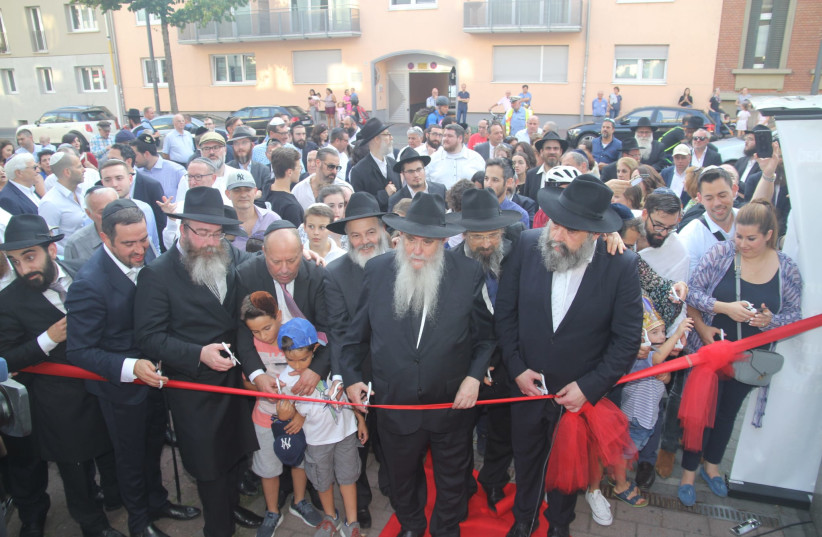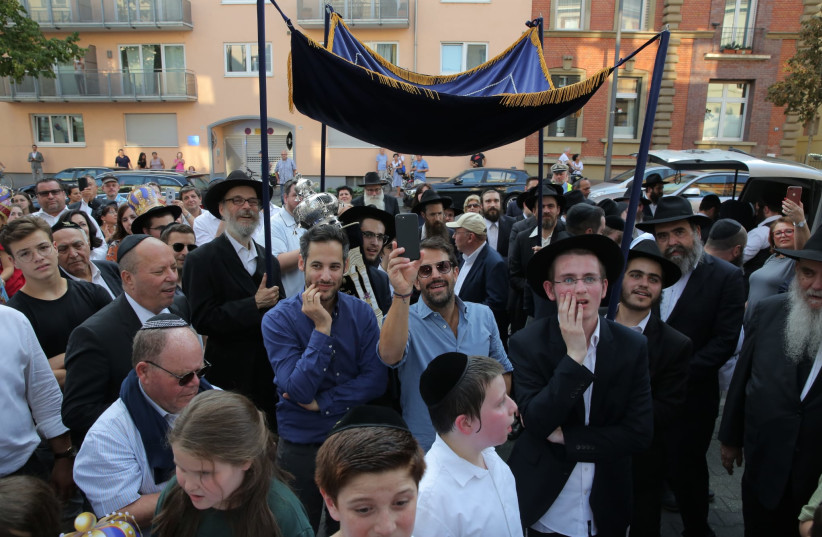A source within the Chabad Jewish community in Frankfurt, which claims to have 1,250 families registered claimed that since the establishment of this community in 2019, said that despite their efforts to receive state funding from the Hesse government, they have not gotten an answer.
A source in the community told The Jerusalem Post that “after several years in which the state refuses to dedicate a budget for our community, in accordance with German law,” they have decided to officially “embark on a legal battle and claim that intentional harassment prevents them from the possibility of financing security for the building.”
They explained that the need for security in synagogues and community centers is important, since “a number of attacks that targeted Jewish communities had taken place in Germany in recent years, but were stopped because of a protected door the terrorist came across.”
Some of the congregants are Ukrainian refugees
Frankfurt is the fifth largest city in Germany and is considered an important international financial center. The Jewish community there is one of the oldest in Europe and one of the few that continued in succession from the Middle Ages.

The Chabad community was established in 2019, after many years of its rabbi, Zalman Gurevitz, being on rocky terms with the older, more established community, the Jüdische Gemeinde Frankfurt am Main, established in 1949. It is one of the largest unified Jewish communities in Germany and considers itself inclusive of “diverse forms of Jewish life,” including liberal and Reform Jewish services, as well as Orthodox ones. The community numbered 6,316 as of 2019.
In 2017, JTA reported that the Frankfurt Jewish community distanced itself from the city’s Chabad-Lubavitch chapter after a series of alleged instances of “disrespect” shown against local non-Chabad rabbis.
In an open letter, the Jewish Community of Frankfurt am Main group wrote that the city’s synagogues will no longer provide rooms for Chabad events. The letter cited “increasingly aggressive behavior” and “insults” from Chabad rabbis aimed at two local rabbis, Avichai Apel and Julian Chaim-Soussan.
“Jewish and religious life in Frankfurt was possible before Chabad and we are ensuring that it will continue to be possible without the involvement of Chabad,” the Frankfurt group said in its letter.

Gurevitz, a Chabad emissary who grew up in France, established the new community, calling it the Orthodox community of Frankfurt (Jüdische Gemeinde Chabad). He invested in bringing over emissaries, founded a yeshiva, and began offering services. In 2007, Gurevitz became known internationally after being stabbed by a Muslim terrorist when he returned from the synagogue to his home.
In accordance with the German Law on Religions and Churches, Dr. Bernd Schlueter, a lawyer hired by the Jewish community four years ago, submitted a request for assistance to the Hessisches Kultusministerium (Education Ministry of the State of Hesse) in accordance with the principles enshrined in the Basic Law of the Federal Republic of Germany. The Post has queried the Hesse Education Ministry. It has not received a response.
The Chabad community sent a letter to Hesse Education Minister Alexander Lorz on May 30th, via Schlueter, in which they said that “Chabad Frankfurt submitted a detailed application for participation in the services to promote Jewish life in Hesse. The right to equal participation in such state benefits has been fully recognized by case law and in a large number of state treaties.
“We have not received a decision on our application to date. After years of waiting for a decision on the application, our clients understandably have no more patience,” Schlueter wrote. He added that they would file a lawsuit against the government for discrimination.
A source in the community told the Post that the treatment the community has received is unusual and meticulous in comparison to others. He added though that “we have no doubt that this harassment does not represent the majority of the citizens of the state and most of the officials of the state of Hesse.”
JTA contributed to this report.
